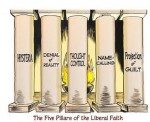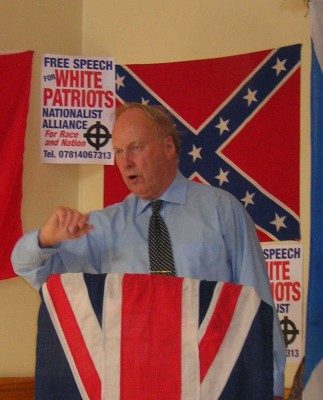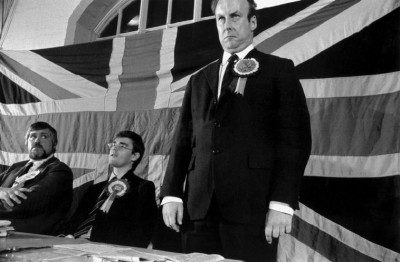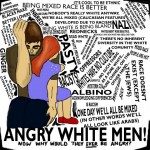The word liberalism has been in common use in political discourse for more than two hundred years. Why is its meaning so ambiguous and changed so dramatically over time?
In short, it is due to a shift away from White/Aryan origins to a contemporary judaized meaning. The word itself is emblematic of the racial struggle for control of Europe.
liberal, at Online Etymology Dictionary:
liberal (adj.)
mid-14c., “generous,” also, late 14c., “selfless; noble, nobly born; abundant,” and, early 15c., in a bad sense “extravagant, unrestrained,” from Old French liberal “befitting free men, noble, generous, willing, zealous” (12c.), from Latin liberalis “noble, gracious, munificent, generous,” literally “of freedom, pertaining to or befitting a free man,” from liber “free, unrestricted, unimpeded; unbridled, unchecked, licentious,” from PIE *leudh-ero- (source of Greek eleutheros “free”), probably originally “belonging to the people” (though the precise semantic development is obscure), and a suffixed form of the base *leudh- “people” (cognates: Old Church Slavonic ljudu, Lithuanian liaudis, Old English leod, German Leute “nation, people;” Old High German liut “person, people”) but literally “to mount up, to grow.”
With the meaning “free from restraint in speech or action,” liberal was used 16c.-17c. as a term of reproach. It revived in a positive sense in the Enlightenment, with a meaning “free from prejudice, tolerant,” which emerged 1776-88.
The original meaning of liberal was noble, and thus synonymous with aryan.
Originally based on two main principles: liberty (freedom from constraints on speech and thoughts) and equality (every human born possessing “natural rights”, ala John Locke).
Contemporary, judaized liberalism is actually the opposite – granting special preferences to “protected classes”, and defining special “hate crimes” for offenses against them.
Liberalism rejected the notions, common at the time, of hereditary privilege, state religion, absolute monarchy, and the Divine Right of Kings.
Liberalism thus developed in opposition to the long-standing socio-political status quo in Europe, overturning and destroying it. In retrospect it was not a natural expression of European nature, but represented a revolution, a turn toward jewish rule and the complete destruction of Europeans which looms today.
The notion that liberalism seeks equality is a fraud. The reality is that it elevates non-Whites above Whites – jews are the archetype, elevated first and highest, above everyone else.
With the rise of the Enlightenment, the word (liberal) acquired decisively more positive undertones, being defined as “free from narrow prejudice” in 1781 and “free from bigotry” in 1823.[13] In 1815, the first use of the word liberalism appeared in English.[14] By the middle of the 19th century, liberal started to be used as a politicised term for parties and movements all over the world.
The shift in meaning and spread of liberalism corresponds/correlates with the emancipation of jews. Tolerance and freedom from prejudice and bigotry enabled the jews to more easily infiltrate, manipulate and exploit White society. Here we see the beginnings of anti-“racism”.
During the twentieth century, liberal ideas spread even further, as liberal democracies found themselves on the winning side in both world wars. Liberalism also survived major ideological challenges from new opponents, such as fascism and communism.
The jews won those wars – securing and entrenching jewish power while disempowering Europeans. Communism was a jewish project, not an opponent of liberalism. They share major features, including central banking, internationalism, and an Orwellian drive for equality (metastasizing into anti-“racism” and ultimately anti-Whitism).
As such, the meaning of the word “liberalism” began to diverge in different parts of the world. According to the Encyclopedia Britannica, “In the United States, liberalism is associated with the welfare-state policies of the New Deal program of the Democratic administration of Pres. Franklin D. Roosevelt, whereas in Europe it is more commonly associated with a commitment to limited government and laissez-faire economic policies.”
These contradictory meanings reflect a different emphasis on freedom versus equality (which are at odds).
What liberalism supposedly means:
Despite these variations, liberal thought does exhibit a few definite and fundamental conceptions. At its very root, liberalism is a philosophy about the meaning of humanity and society. Political philosopher John Gray identified the common strands in liberal thought as being individualist, egalitarian, meliorist, and universalist. The individualist element avers the ethical primacy of the human being against the pressures of social collectivism, the egalitarian element assigns the same moral worth and status to all individuals, the meliorist element asserts that successive generations can improve their sociopolitical arrangements, and the universalist element affirms the moral unity of the human species and marginalises local cultural differences.
This is the “philosophy about the meaning of humanity and society” which Whites are propagandized to believe.
Meliorism is an idea in metaphysical thinking holding that progress is a real concept leading to an improvement of the world. It holds that humans can, through their interference with processes that would otherwise be natural, produce an outcome which is an improvement over the aforementioned natural one.
The real, jewish liberalism is completely different. It is not individualist; it is collectivist (group/bloc-oriented, identity politics, partisan politics). It is not egalitarian; non-Whites are collectively elevated above Whites, Whites are blamed for “racism”/privilege. It is not meliorist; dengeneracy is promoted and celebrated, Whites excelling or progressing is regarded as evidence of “racism”/privilege. It is not universalist; it sets everyone, including Whites, against Whites.
Liberalism, as a “philosophy about the meaning of humanity and society”, has become entangled with democracy.
Liberal democracy is a form of government in which representative democracy operates under the principles of liberalism, i.e. protecting the rights of minorities and, especially, the individual. It is characterised by fair, free, and competitive elections between multiple distinct political parties, a separation of powers into different branches of government, the rule of law in everyday life as part of an open society, and the equal protection of human rights, civil rights, civil liberties, and political freedoms for all persons.
Porter, at The Kakistocracy, describes how it works in practice:
Liberalism is two jews and a black voting on which white to have for lunch;
Conservatism is a well-armed white enforcing the vote.
In 1961 the poet Robert Frost remarked:
A liberal is a man too broadminded to take his own side in a quarrel.
Podcast: Play in new window | Download













